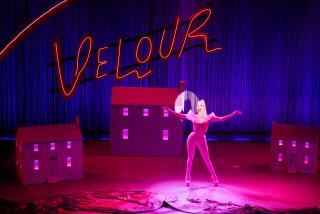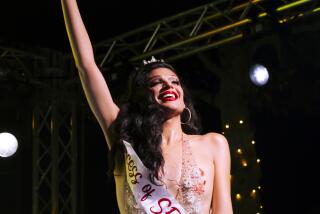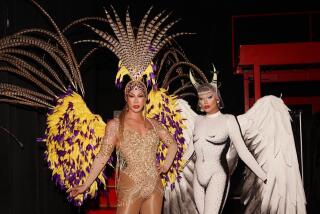Review: How RuPaul channeled, and flattened, a century of queer life
“Legendary Children” uses “Drag Race” to reinterpret a rich history
- Share via
Eleven years into its run, “RuPaul’s Drag Race” is no longer a kitschy cult favorite on a little network called LOGOtv: It’s a sprawling media empire, with multiple international spinoff series and six Emmy Awards under its glittery belt. And RuPaul himself is bona fide mainstream. This winter, he’s graced the cover of Vanity Fair, hosted “SNL” and formally claimed his title as the “queen of drag” on “The Tonight Show.” For millions, RuPaul and drag itself are one and the same: mouthy, glamorous and male.
Yet RuPaul doesn’t speak for the drag movement. This much became clear last March, when he made some insensitive comments to the Guardian about the show’s first openly transgender contestant: “Drag loses its sense of danger and its sense of irony once it’s not men doing it.” RuPaul later backpedaled, but it wasn’t the first (or last) time he expressed controversial views about gender. Back in 2016, I published an interview with him at Good magazine; asked what he thought about people who view drag as a transphobic or misogynist art form, he didn’t exactly hold back: “They’re ... idiots and who cares about them. [...] This world is upsetting, get used to it.”
RuPaul’s polarizing comments are often amplified on social media platforms that prefer to parse icons into good or evil, woke or canceled. Seeing the bigger picture requires cultural context. For Tom Fitzgerald and Lorenzo Marquez, the savvy critics behind pop culture blog TomandLorenzo.com, “RuPaul’s Drag Race” is a fabulous, groundbreaking delight — not to mention “the queerest show in the history of television.” But it’s also a narrow showcase of a diverse, defiant art form — a window onto a world far bigger than it could ever be. Their book “Legendary Children: The First Decade of RuPaul’s Drag Race and the Last Century of Queer Life” celebrates what the show has done for the LGBTQ movement, noting many of the iconic performances and delicious controversies that turned it into a hit. But the authors are more invested in contextualizing these moments than reliving them.
Whenever something niche finds this much success, there’s a risk that its complexities will flatten out, shedding what made it special in the first place. “Legendary Children” aims to broaden our understanding of the rich drag culture driving every scene of “Drag Race.” The book’s 10 chapters turn “Drag Race’s” challenges and recurring elements (the Pit Crew, Snatch Game, etc.) into a deceptively simple framing device for a nuanced exploration of the gender-bending figures, insider lingo and significant milestones in queer history to which the show owes its existence.
The first chapter links the Werk Room to the famous Stonewall Inn. The former is where “Drag Race” contestants prep for challenges, apply their makeup and allow themselves to be emotionally vulnerable; the latter was a safe space where queer New Yorkers could relax and be themselves in a dangerous era. In 1969, when police raided the Stonewall, the gay community within violently rose up in what became a landmark event in LGBTQ history. “Prior to the riots,” the authors argue, “only the most radical of queer thinkers and activists could ever dream of a world where queer people could openly live their lives.” Two radical thinkers turned out to be among the bravest Stonewall instigators: Marsha P. Johnson, a transgender woman and drag queen, and Stormé DeLarverie, a drag king. Fitzgerald and Marquez devote pages to each of their stories, celebrating hidden figures in an episode many readers will come in thinking they knew everything about.
Though the book makes no claim to being a definitive text on queer history, it presents powerful (and fun!) new angles on pivotal moments, seamlessly woven into elements of the show. The “Lip Sync for Your Life” showdown gives Fitzgerald and Marquez the perfect excuse to revisit the illegal gay house parties of the early 20th century, in which proto-drag queens could put on a record, pantomime freely and pretend to sing their hearts out. The chapter about the show’s hilarious Library mini-challenge, in which contestants “read” — or gracefully insult — each other in the grand tradition of the 1991 documentary “Paris Is Burning,” is an epic master class on throwing shade and the queens who threw it best. (If you haven’t yet heard of Crystal LaBeija or her devious takedown of a privileged white queen named Rachel Harlow, I recommend you hold off on Googling; the witty, insightful breakdown in the book is worth waiting for.) Even the Pit Crew, those scantily clad muscular men who wordlessly attend to “Drag Race” contestants’ every need, is granted meaningful roots in the fetishistic portraiture of Robert Mapplethorpe and erotic sketches of Tom of Finland.
For a book about reality television, “Legendary Children” is unusually ambitious — an obsessively detailed portrait of modern LGBTQ life and how it came to be. Operating from a baseline position of fondness for RuPaul and all the progress his show has inspired, it also demands more from him. Toward the end of the book, Fitzgerald and Marquez get personal, making a plea to readers that might as well be addressed directly to RuPaul: “We are a happily married white gay male couple who are about as mainstream as the modern LGBTQ community can get, but we would never advocate our own lives as the model upon which all queer lives should be based, nor should anyone else.”
Queer America comprises anarchists and firebrands of every gender, color, age and inclination fighting not just for prizes but for their lives. Perhaps one day soon, “Drag Race” will be more firmly rooted in the history from which it borrows madly — but not always as respectfully as it could.
Wudel is a writer and the former deputy editor of Good magazine and Upworthy.
Tom Fitzgerald and Lorenzo Marquez
Penguin: 288 pages, $17
More to Read
Sign up for our Book Club newsletter
Get the latest news, events and more from the Los Angeles Times Book Club, and help us get L.A. reading and talking.
You may occasionally receive promotional content from the Los Angeles Times.







